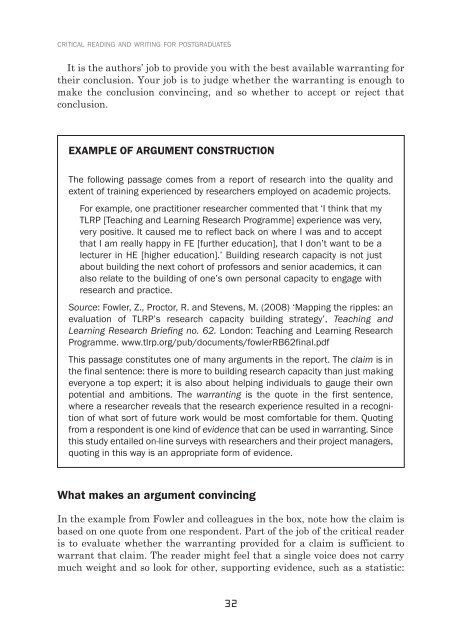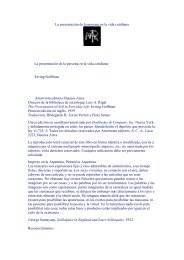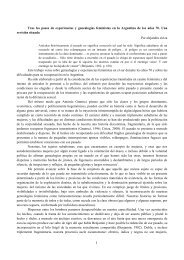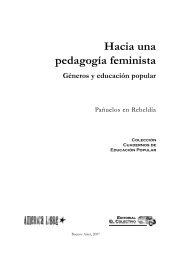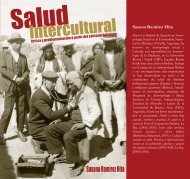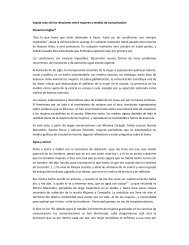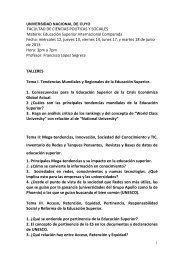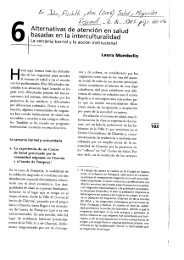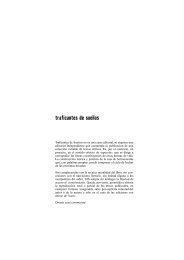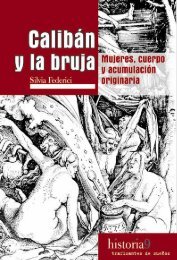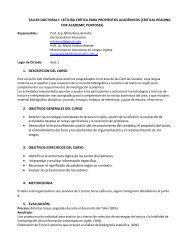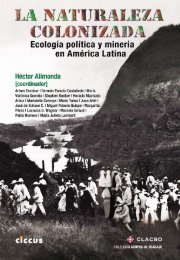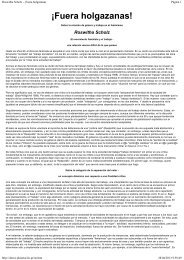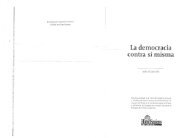Critical Reading and Writing for Postgraduates - Doctorado en ...
Critical Reading and Writing for Postgraduates - Doctorado en ...
Critical Reading and Writing for Postgraduates - Doctorado en ...
Create successful ePaper yourself
Turn your PDF publications into a flip-book with our unique Google optimized e-Paper software.
critical reading <strong>and</strong> writing <strong>for</strong> postgraduates<br />
It is the authors’ job to provide you with the best available warranting <strong>for</strong><br />
their conclusion. Your job is to judge whether the warranting is <strong>en</strong>ough to<br />
make the conclusion convincing, <strong>and</strong> so whether to accept or reject that<br />
conclusion.<br />
EXAMPLE OF ARGUMENT CONSTRUCTION<br />
The following passage comes from a report of research into the quality <strong>and</strong><br />
ext<strong>en</strong>t of training experi<strong>en</strong>ced by researchers employed on academic projects.<br />
For example, one practitioner researcher comm<strong>en</strong>ted that ‘I think that my<br />
TLRP [Teaching <strong>and</strong> Learning Research Programme] experi<strong>en</strong>ce was very,<br />
very positive. It caused me to reflect back on where I was <strong>and</strong> to accept<br />
that I am really happy in FE [further education], that I don’t want to be a<br />
lecturer in HE [higher education].’ Building research capacity is not just<br />
about building the next cohort of professors <strong>and</strong> s<strong>en</strong>ior academics, it can<br />
also relate to the building of one’s own personal capacity to <strong>en</strong>gage with<br />
research <strong>and</strong> practice.<br />
Source: Fowler, Z., Proctor, R. <strong>and</strong> Stev<strong>en</strong>s, M. (2008) ‘Mapping the ripples: an<br />
evaluation of TLRP’s research capacity building strategy’, Teaching <strong>and</strong><br />
Learning Research Briefing no. 62. London: Teaching <strong>and</strong> Learning Research<br />
Programme. www.tlrp.org/pub/docum<strong>en</strong>ts/fowlerRB62final.pdf<br />
This passage constitutes one of many argum<strong>en</strong>ts in the report. The claim is in<br />
the final s<strong>en</strong>t<strong>en</strong>ce: there is more to building research capacity than just making<br />
everyone a top expert; it is also about helping individuals to gauge their own<br />
pot<strong>en</strong>tial <strong>and</strong> ambitions. The warranting is the quote in the first s<strong>en</strong>t<strong>en</strong>ce,<br />
where a researcher reveals that the research experi<strong>en</strong>ce resulted in a recognition<br />
of what sort of future work would be most com<strong>for</strong>table <strong>for</strong> them. Quoting<br />
from a respond<strong>en</strong>t is one kind of evid<strong>en</strong>ce that can be used in warranting. Since<br />
this study <strong>en</strong>tailed on-line surveys with researchers <strong>and</strong> their project managers,<br />
quoting in this way is an appropriate <strong>for</strong>m of evid<strong>en</strong>ce.<br />
What makes an argum<strong>en</strong>t convincing<br />
In the example from Fowler <strong>and</strong> colleagues in the box, note how the claim is<br />
based on one quote from one respond<strong>en</strong>t. Part of the job of the critical reader<br />
is to evaluate whether the warranting provided <strong>for</strong> a claim is suffici<strong>en</strong>t to<br />
warrant that claim. The reader might feel that a single voice does not carry<br />
much weight <strong>and</strong> so look <strong>for</strong> other, supporting evid<strong>en</strong>ce, such as a statistic:<br />
32


